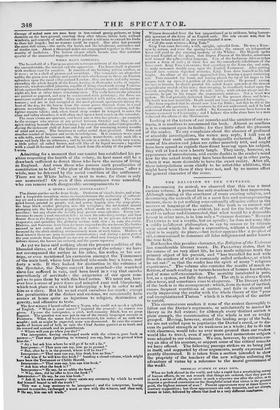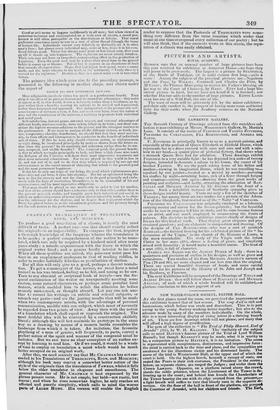THE RELIGION OF THE UNIVERSE.
IN announcing its arrival, we observed that this was a most curious volume. A perusal has only confirmed the first impression. Although aiming at the overthrow of every existing religion, and denouncing the untruth of all in a most free and uncompromising manner, there is yet noticing conventionally offensive either in the manner or language of the author. His faith is so earnest and so simple, his conviction so evident, his zeal for the benefit of the world so ardent and disinterested, that what would he a damnable heresy in other men, is in him only a "strange doctrine." ROBERT FEII.OIVEs is not a sceptic, but an apostle; he does not come like a coldly indifferent philosopher, to sap by reason or by ridicule sorae creed which he deems a superstition, without a thought of what is to supply its place,—but rather appears like a prophet of old, commissioned to denounce all false religions and make known the true faith.
But besides this peculiar character, the Religion of the Uoiverse has considerable literary merit. Dr. FELLowes states, that in the course of no very short life, he has made religious truth the primary object of his pursuit, and "has travelled far and wide from the confines of what is commonly called orthodoxy, at which he set out :" so that the reader has the spirit of many " religious experiences." The volume also contains the results of much reflection, of much reading in various branches of human knowledge, and of some self-examination. The morality inculcated is pure, but, as a system, not fully developed. The style is always fluent, often terse, and sometimes rises to eloquence. The literary defect of the book is in the arrangement ; which, from its want of method, causes frequent repetitions of matter, and fails in clearly and easily impressing the reader with the whole theory of the " pure and unsophisticated Theism " which it is the object of the author to unfold.
This circumstance renders it none of the easiest thoroughly t3 follow out the Doctor's arguments, or satisfactorily to master his theory in its full extent; for although every-distinct section is plain enough, the concatenation of the whole is not so readily grasped. Having, however, stated the leading scope of the book, we are not called upon to popularize the Doctor's creed, or to discuss its partial strength or its weakness as a whole; for to do this with clearness, would take us over more ground than our readers would like to travel, even if such grave and momentous subjects 1 were adapted to our columns. We can, however, by extracts convey an idea of his manner, or support some of the critical remarks we have offered. The following passage strikes us as being just in itself, and supported by close arguments, neatly expressed and prettily illustrated. It is taken from a section intended to show the propriety of the teachers of the new religion enforcing the advantage of virtue by a reference to the moral government of the world.
roevicat JUSTICE IN REAL LIFE.
When we look abroad in the world, and take a rapid but a scrutinizing survey of human affairs, do we not remark that things arc ordered, that they pass Oa in such a series of effects, or move in such a sequence one after the other, as to impress a profound conviction on the thoughtful mind that virtue is the greatest good, the highest interest of man ? Present appearances may at times favour a contrary supposition; but these appearances are only transient, and are always, sooner or later, followed by effects that lead to a very different contlesion. Good or evil seems to happen indifferently to all men ; but when viewed in numerous instances and contemplated on a wide area of events, a moral preference is still often perceptible in the distributions of felicity. That moral preference sometimes seems to run in a sort of silver thread through the tissue of human life. individuals cannot very definitely or distinctly see it in other men's lives ; but almost every individual may, more or less, trace it in his own. Good follows good. Virtue has always sonic more or less latent root, that runs on till it shoots up into happiness. The righteous are never utterly forsaken. Their acts may not have an immediate corresponding effect in the production of
m happiness. Even the good seed may lie a o i re than usual time n the ground before it conies up or blooms. But at last it appears in an abundance of fruit that exceeds all expectation. Hope, that had begun or despond, wears a sunny smile, and the heart vibrates to the truth of the sentiment, " Verily there is a reward for the righteous." Doubtless there is a moral order even in terrestrial things.
The primary idea which gave rise to the precedincr passage, is presented in the following in another shape, and shown under the aspect of
VIRTUE ITS OWN IMMEDIATE REWARD.
Most religionists inculcate virtue too much :is a posthumous benefit. They strip it too often of its present charms and its immediate advantages: they make it appear as if, in this world, it was a deformity rather than a loveliness, an injury rather than a benefit ; causing its authors to be reviled and depreciated, rather than honourerl and approved. But, independent of the pleasureable selfconsciousness of virtuous action, it has, and must ever have, from the nature of man and the constitution of the universe, a tendency to promote both individual and social good.
Self-satisfaction, inward peace, outward respect, and external advantages of different kinds, must necessarily, more or less, follow in its train ; and these constitute the highest recommemhitions to the pursuit and the strongest motives to the performance. If we were to analyze all the different virtues, as truth, justice, temperance, chastity, beneficence we should find that theymust necessa
rily, in their effects and consequences, conducive to the benefit of individuals and of states. If this be true, why should virtuous action, or righteousness, or right doing, be inculcated principally by motives drawn from the future rather than the present? by its uncertain and unknown, rather than by its certain, temporal, and visible benefits? The temporal good, the present benefit, is that to which we ought principally to look, and from which those who teach the Religion of the Universe will draw their most impressive arguments and their most animated exhortations. For we are placed in this world to live in it, and not out of it, and to do that duty which is required by our age and circumstances as the surest means of obtaining that which is the greatest good and the most permanent happiness.
If this life be only one stage of our being, the good which righteousness pro. duces does not end here, it runs into eternity. But for an ephemeral being like man to live for eternity and not for time, or to do good primarily and exclusively with the hope of everlasting blessedness, is to be unmindful of his real circumstances and his most imperative obligations.
That man should be placed in one world only in order to live for another, and that all his actions should have a reference only to that other, rather than to the present material, visible, and tangible good, both individual and social, to which an undeviating comse of moral action almost invariably leads, is to abandon the substance for the shadow, and to despise that enjoyment which the Deity has placed before us as the incentive to goodness and the prituary though not the sole motive to the performance.



























 Previous page
Previous page